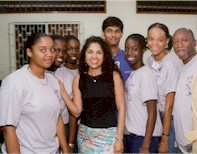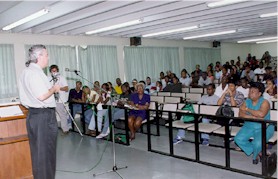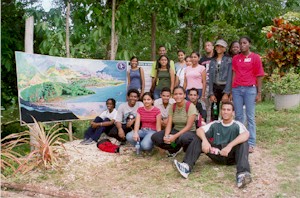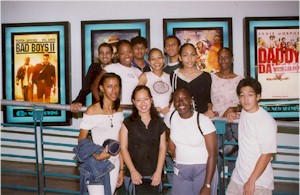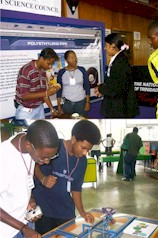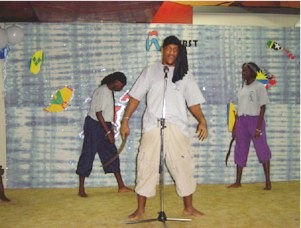"It motivated us to formulate goals, work harder and become passionate about our careers and lives...It exemplifies that in order to progress in our region, we need to work with other members of CARICOM"
This statement from an eighteen (18) year old, Trinidadian participant, epitomises to a great extent the major objectives of the recently concluded Caribbean Youth Science Forum (CYSF 2003).
One hundred and fifteen (115) students from six (6) Caribbean territories (Antigua, Barbados, Grenada, St. Kitts, St. Vincent, Trinidad & Tobago) came together for one (1) week, in an extraordinary atmosphere of lectures, debates, field trips and social activities. As one student so aptly put it "informative sessions, friendly atmosphere, good food and fantasticspeakers".
To launch the week's proceedings, Dr. Luz Claudio, Senior Scientist at the Mount Sinai School of Medicine, delivered the feature address titled "Scientific Solutions to Social Problems". Professor Dyer Narinesingh, Chairman of the National Science Centre Advisory Committee, formally declared the forum open.
From economists, to immunologists, a wide spectrum of esteemed lecturers and experts shared their knowledge with the young participants.
Professor Kenneth Ramchand in the first plenary session of the Forum explored the issue of "Working and Living a Career". He asked participants to consider where a job and a career fit into the larger design of life. These A-Level students were reminded of the fact that pursuing a degree does not automatically lead to a career but should be looked at as an opportunity for enlightenment and a means of developing one's own sense of discovery. On Wednesday 06th, Mr. Dennis Pantin offered an economic viewpoint, as he spoke on "The Distribution of Wealth and the Effects on the Environment". Mr. Pantin explored the impact of industries like tourism on the environment, as well as the broader link between the environment and socio-economic development. Another very thought provoking lecture/discussion was presented by Mr. Kellman Gomez-Adams, titled "Pills, Thrills and Supermen". Mr. Gomez-Adams dealt with drug dependencies and outlined the effects of some of the major types of drugs, including alcohol, tobacco and cannabis. Professor Julian Duncan spoke on the very topical issue of genetically modified organisms. Professor Duncan delved into the question of genetic engineering and whether in fact it could be managed.
Mrs. Camille Selvon-Abraham held both an entertaining and engaging session on Computer Creativity and Animation, while Mrs. Vitra Bahadoorsingh aroused the audience's curiosity about Forensic Science with an absorbing lecture entitled "Hello, who have we here?" Reverend Don Hamilton dared to "enter the matrix" in a lecture/discussion on "The Philosophy of the Matrix". Dr. Jeffrey Edwards of the Medical Research Foundation spoke on a subject of widespread interest, "Sexually Transmitted Infections and You". Dr. Eric Jolly, an internationally acclaimed science educator/researcher, recounted his life experiences, showing the impact Science and Technology has had on his personal development. He challenged the group to think about the "Irony of Higher Science Education".
One of the new areas introduced in this second instalment of the Caribbean Youth Science Forum, was the debate. Three very current topics were divided among the participating schools and country teams at the Forum. The topics dealt with (1) compensating countries for genetic materials removed from their respective ecosystems; (2) biotechnology and its possible impact on global hunger; and (3) the effect of the spread of pandemic diseases on Tourism in the Caribbean. The debates were exciting and afforded participants the opportunity to express themselves, as they challenged the positions of opposing speakers. One delegate commented that she was so invigorated by the debates that she "would not have missed them for the world"
At the Asa Wright Nature Centre and the Wild Fowl Trust, the youngsters were introduced to the diversity of our nation's flora and fauna. Other tours included visits to the Vehicle Maintenance Corporation of Trinidad & Tobago, the Chaguaramas Military Museum and the Sugar Cane FeedsCentre.
During the course of the week, there were two special sessions in the evening dedicated to "Socialising with Scientists". Participants found the scientists quite affable. During this time, local and international scientists, who included Dr. Shirin Haque-Copilah (Physics & Astronomy), Dr. Margaret Bernard (Computer Science & Mathematics), Dr. Eric Jolly (Science Education and Research), Drs. David Picou and Zalika Ali (Medicine) were invited to share their experiences with the students. "Mind opening" were the words used by one student to describe this activity, as another appreciatively proclaimed that "the opportunity to interact with such accomplished scientists would never beforgotten".




